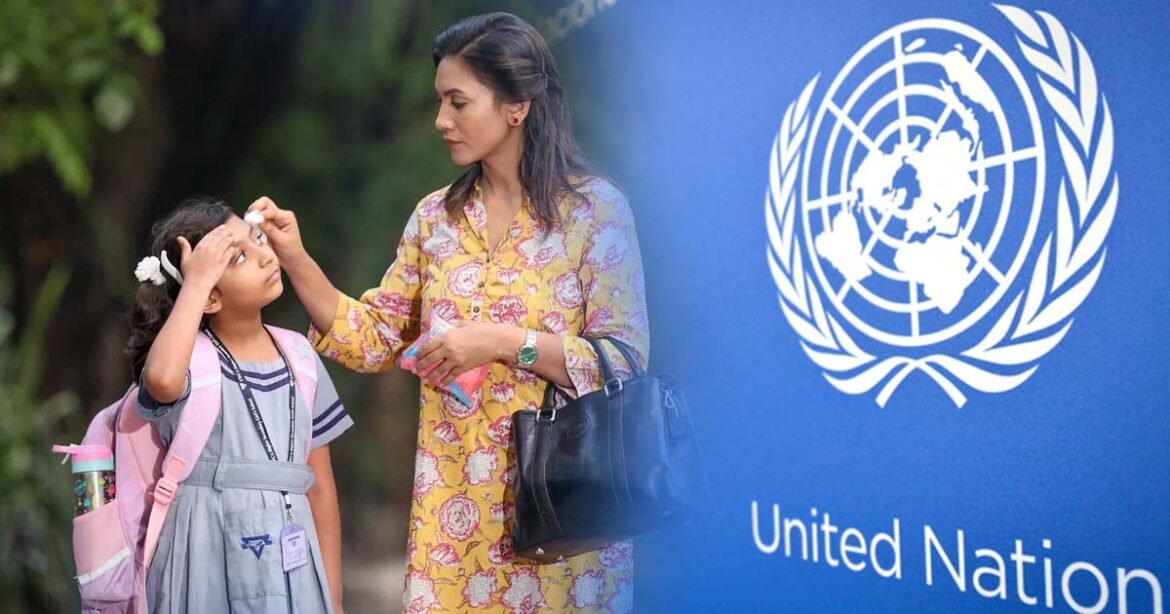The data underscores the urgent need for attention and action to safeguard the well-being of young populations in the region
The United Nations’ children’s agency reported that almost 500 million children in South Asia are being exposed to highly dangerous heat waves as a consequence of the intensifying and more frequent climate-induced crises. These extreme high temperatures pose life-threatening risks to the young population in the region.
On Monday, UNICEF revealed that their analysis of 2020 data indicated a staggering 460 million children from countries like Afghanistan, India, and Pakistan faced temperatures where 35 degrees Celsius (95 Fahrenheit) or higher persisted for 83 days or more in a year. This has made South Asia the most severely impacted region for children under the age of 18.
UNICEF’s analysis further disclosed that a concerning 76% of children in South Asia were exposed to these extreme high temperatures, while the global average for such exposure stood at 32%. The data underscores the urgent need for attention and action to safeguard the well-being of young populations in the region.
Global warming records soaring temperatures in July
Globally, concerns have escalated as July recorded the highest temperatures ever documented. These rising temperatures raise apprehensions about the future well-being of all children, particularly those in South Asia, who are likely to face more frequent and severe heat waves due to climate change.
Sanjay Wijesekera, the UNICEF Regional Director for South Asia, emphasized that global warming is an alarming reality, and the data unequivocally indicate that the lives and welfare of millions of children in the region are endangered by the impact of heat waves and soaring temperatures.
South Asian Children at ‘Extreme Risk’ from Climate Change
The United Nations has issued a warning highlighting the vulnerable position of children in Afghanistan, Bangladesh, India, Maldives, and Pakistan, stating that they are at “extremely high risk” due to the effects of climate change. The UN defines extreme high temperatures as those exceeding 35 degrees Celsius (95 degrees Fahrenheit) for 83 or more days in a year.
Children, being less adaptable to temperature fluctuations and unable to efficiently dispel excess heat from their bodies, are particularly susceptible to these rising temperatures.
The global warming of approximately 1.2 degrees Celsius since the late 1800s, primarily driven by the burning of fossil fuels, has led to more intense, prolonged, and frequent heatwaves, as well as intensified storms and floods.
Heatwave in Bangladesh
According to the Bengali calendar, summer is still two days away, but a mild-to-moderate heatwave is sweeping over Dhaka and the majority of the country. In the second week of April, Dhaka has been experiencing high temperatures and high humidity of 84%. Although heatwaves have always existed, the current problem is that, due to climate change, they are becoming more severe and prevalent.
On last Tuesday, Chuadanga recorded a maximum temperature of 39.2 degrees Celsius, while Tentulia recorded a minimum temperature of 16.5 degrees Celsius. As a result, the country’s population continues to endure sweltering heat. So far in April, the highest temperature recorded in Dhaka is 38 degrees Celsius.
Experts predict more frequent, prolonged heat waves
Experts predict that the climate crisis will lead to more frequent and prolonged heat waves in the future, posing a significant challenge to the region’s ability to adapt.
India, with a population of 1.4 billion, already experiences heat waves during the summer months of May and June, but recent years have witnessed earlier and more extended heat waves.
In April 2022, India faced a severe heat wave, with New Delhi experiencing temperatures above 40 degrees Celsius for seven consecutive days. The heatwave resulted in school closures, crop damage, and strain on energy supplies. Authorities advised residents to stay indoors and stay hydrated.
Afghanistan faces an even graver threat due to its high potential for record-breaking extreme heat, compounded by dire social and economic issues.
Extreme weather events have also caused deadly impacts in other parts of the region. Pakistan, for instance, witnessed severe flooding caused by record monsoon rains and melting glaciers, leading to a third of the country being submerged. The floods claimed nearly 1,600 lives, and tragically, over a third of the victims were children.
Ways to beat the heat
UNICEF is urging frontline workers, parents, families, carers, and local authorities to safeguard children during extreme heat by implementing the following BEAT measures:
- Be Aware: Stay vigilant about heat stroke and protect both yourself and children by adopting preventive measures and learning how to recognize and address increased physical stress from the heat.
- Easily Identify: Familiarize yourself with the symptoms of heat-related illnesses, particularly crucial for caregivers, communities, and frontline workers who need to be fully informed.
- Act Immediately: Take prompt protective actions. Caregivers and frontline workers should learn first aid steps to stabilize body temperature in the short term.
- Take To A Health Facility: If necessary, immediately seek medical attention. Frontline workers, families, and caregivers should be quick to recognize severe heat exposure symptoms, especially heat stroke, and promptly transport affected individuals to healthcare facilities.
The impact of extreme weather events falls heavily on the most vulnerable, including children, adolescents, and women.
Sanjay Wijesekera emphasizes the urgency of action, stating that young children are particularly vulnerable to the heat. Without intervention, they will continue to suffer from increasingly severe heatwaves in the years to come, despite bearing no responsibility for the situation.
According to scientists, the world must adapt to the existing heat and other impacts caused by emissions, while also significantly reducing carbon pollution in this decade to prevent more severe consequences in the future.


